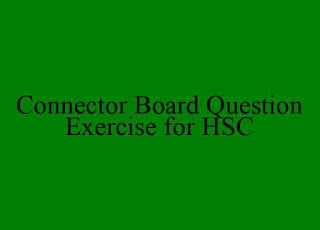Dangling modifier with examples
Dangling modifiers definition
The word “dangling” refers to hanging or swinging loosely. And “modifier” stands for a person or thing that makes partial or minor changes to something. According to English Grammar, a dangling modifier is a word or phrase that modifies a word not clearly stated in the sentence.
In other words, if a modifier (word or phrase) modifies (changes the meaning) different word rather than the targeted one, it will be called dangling modifier. If the modifier of a sentence doesn’t modify the correct Noun or Pronoun, then the meaning of the sentence can be changed.
Example
1. Incorrect: Hearing the good news, happiness was mine.
Or Hearing the good news, happy I was.
Correct: Hearing the good news, I was happy.
2. Incorrect: Having finished the assignment, July turned on the TV.
Correct: Having finished the assignment, the TV was turned on.
3. Incorrect: Having arrived late for practice, a written excuse was needed.
Correct: Having arrived late for practice, the team captain needed a written excuse.
4. Incorrect: Without knowing his name, it was difficult to introduce him.
Correct: Because Maria did not know his name, it was difficult to introduce him.
5. Incorrect: To improve his results, the experiment was done again.
Correct: He improved his results by doing the experiment again.
6. Incorrect: After reading the original study, the article remains unconvincing.
Correct: After reading the original study, I find the article unconvincing.
7. Incorrect: Relieved of your responsibilities at your job, your home should be a place to relax.
Correct: Relieved of your responsibilities at your job, you should be able to relax at home.
8. Incorrect: The experiment was a failure, not having studied the lab manual carefully.
Correct: They failed the experiment, not having studied the lab manual carefully.
There are some particular grammatical structures or phrases or clauses in which dangling modifiers occur. Such as:
Present Participle or Participle Phrase
1. Incorrect: Entering the room, the light was off.
Correct: Entering the room, I found the light off.
2. Incorrect: Walking in the park, a snake bit him.
Correct: Walking in the park, he was bitten by a snake.
3. Incorrect: Walking through the forest, the moon appeared like a luminous ball.
Correct: Walking through the forest, the traveler saw the moon above the trees.
4. Incorrect: Crossing the street, a car almost struck us.
Correct: As we crossed the street, a car almost struck us.
5. Incorrect: Flying out the window, he grabbed the papers.
Correct: Flying out the window, the papers were grabbed by him.
6. Incorrect: Plunging into the water, the drowning child was rescued.
Correct: Plunging into the water, he rescued the drowning child.
7. Incorrect: Not looking where he was going, a car hit him.
Correct: Not looking where he was going, he was hit by a car.
8. Incorrect: Knowing little algebra, solving the problem was difficult.
Correct: Knowing little algebra, I found it difficult to solve the problem.
9. Incorrect: Reading the regulations, the dog did not enter the park.
Correct: After reading the regulations, I did not enter the park with my dog.
10. Incorrect: Understanding the daycare’s policies, the baby waited for her mom.
Correct: Understanding the daycare’s policies, the mother picked up her baby.
Past Participle or Past Participle Phrase
1. Incorrect: Tired and exhausted, a nap was taken by the passer-by.
Correct: Tired and exhausted, the passer-by took a nap.
2. Incorrect: Worn out by a long walk, she fainted.
Correct: As she worn out by a long walk, she fainted.
Perfect Participle (having+V3)/ (having been +V3)
1. Incorrect: Having arrived late for practice, a written excuse was needed.
Correct: Having arrived late for practice, the team captain needed a written excuse.
2. Incorrect: Having been served lunch, the problem was discussed by the members of the committee.
Correct: Having been served lunch, the committee members discussed the problem.
Adjective Phrase
1. Incorrect: Young and inexperienced, the task seemed easy to me.
Correct: Young and inexperienced, I thought the task easy.
2. Incorrect: Old and pervert, fourth marriage seemed not to criticize to him.
Correct: Old and pervert, he didn’t think the fourth marriage to be criticizing.
Reduced Adverbial Clause
1. Incorrect: While walking in the garden, her leg was broken.
Correct: While she was walking in the garden, she broke her leg.
2. Incorrect: While going to class, a dog bit me.
Correct: While going to class, I was bitten by a dog.



